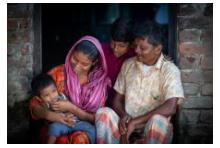In 2024, Bangladesh continues to experience multiple public health emergencies that pose risks for children and families across the country. Cyclones, landslides, and riverbank erosion due to climate change have affected 18.4 million people, leaving about 6.4 million people in need of immediate humanitarian assistance. This extreme weather has led to the destruction of homes and critical infrastructure leading to outbreaks of several diseases. Moreover, a recent severe countrywide heatwave further places children at high risk.
Bangladesh also continues to host over 1 million Rohingya refugees (52% children) from Myanmar in 33 camps in Cox’s Bazar District and Bhasan Char of Noakhali District; these camps are overcrowded and face ongoing challenges in providing refugees with access to education, protection, food, water, shelter, and health services. A fire in Cox’s Bazar refugee camps in January of 2024 left 5,000 Rohingya refugees, including 3,500 children, without a home, leading to a further deterioration of the situation.
UNICEF remains on the ground, working with partners to deliver critical aid to children and their families. So far this year, UNICEF has:
- Admitted 5,137 girls and 5,043 boys aged 6-59 months with severe wasting for treatment
- Provided 192,570 children with access to primary healthcare in UNICEF-supported facilities, of which 70,006 were Rohingya refugees
- Reached 12,814 households with UNICEF-funded humanitarian cash transfers
- Increased 360,335 people’s access to a sufficient quantity of safe water for drinking and domestic needs
With your support, UNICEF will continue to scale up its programming throughout 2024 to reach the most vulnerable in Bangladesh.
